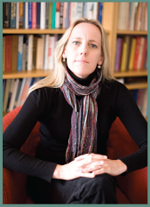Skip the Schadenfreude Buffet and Dig In to Some Humanism

Through no effort of my own I’ve started getting a “word of the day” via email. It comes from a website called Word Genius. The other day the word was schadenfreude, a term I always liked for its specificity but was never quite sure how to say and so rarely employed in speech. (For the record, it’s a German word, pronounced “shaw-den-froy-duh” with accents on the first and third syllables. Thank you, Word Genius.)
Dictionaries define schadenfreude as the enjoyment obtained from the troubles of others. However, it’s always been my understanding (and every example given in dictionaries conveys this) that the enjoyment stems from the sense that the person experiencing misfortune deserves it. At least in the eyes of the person taking pleasure. It’s a kind of payback—a sense of justice served for a past wrong that’s seen as somewhat equal to what the wrongdoer is experiencing. A funny cartoon titled “Adult Amusement Park” lists several examples, including “office backstabber receives letter from the IRS” and “taxi stealer breaks tooth on stale biscotti.” But, wait, losing a taxi isn’t nearly as painful or pricey as losing a tooth. I think maybe folks are enjoying the suffering of others a little too much.
Word Genius also tracks a word’s popularity over time, and, as shown in a Google usage graph, schadenfreude shot up considerably around the turn of the twenty-first century. Is this related to the incivility, tribalism, and nastiness many feel has ramped up of late, ushering in the Trump presidency and seemingly on steroids ever since?
The War for Kindness: Building Empathy in a Fractured World, a new book by Jamil Zaki, who directs the Social Neuroscience Lab at Stanford University, sheds some light on this question. “One of our most powerful psychological instincts is to divide people into categories; for every ‘us’ there is a ‘them,’” Zaki observes in a June 7 interview at the Economist.
This turns pernicious when mixed with competition, conflict, and fear. Under these circumstances, empathy evaporates or even reverses into schadenfreude, or enjoyment of the other side’s suffering. The wreckage of America’s political climate, mixed with social media and online bullying, can seem like a schadenfreude buffet.
Note that Zaki characterizes schadenfreude as “the other side’s suffering.” Here, it’s no longer about laughing when someone who wronged you gets a comeuppance. It’s about reveling over the other team losing, the opposite camp suffering a major blow. I think we can all honestly say we’re susceptible to this form of schadenfreude today.
While schadenfreude has risen, Zaki offers psychological data that shows empathy levels have dropped over time, with a steep decline in the twenty-first century. “Strikingly,” he says, “the average American in 2009 scored as less empathic than 75 percent of people in 1979.”
While The War for Kindness makes the case that empathy isn’t hardwired but rather can be encouraged (or discouraged), these statistics left me more than a bit glum. And so, in putting together the issue at hand, I felt in need of a kind of pep talk, which I now pass along to you.
Ryan Bell brings inspiring news of secular students who are forming campus groups that share specific values and help combat the loneliness and depression so many young people feel. AHA Director of Education Kristin Wintermute unveils the Center for Education’s new Ten Commitments to guide us in living humanist values, including empathy, ethical development, and critical thinking. Tom Krattenmaker outlines the crucial contribution humanists can make to ensuring the survival and flourishing of our “complicated, messed-up, disappointing, and amazing species and the countless other species of plants and animals with which we share the earth.” Mark Dunbar and Mark Anthony Kaye critique the effect of capitalism and the employer-employee dynamic on the individual, while this issue’s columnists explore a variety of pressures we currently face, offering inspiration and techniques for reducing them.
And yes, in addition to seeking community with like minds, it’s extremely important for the health of society that we interact with people who are different than us in a variety of ways. “The punchline is simple,” Zaki writes of building empathy in a fractured world. “Hatred of outsiders is ancient but not inevitable. When people work, live, or play alongside each other, divisions between them melt.”
So skip the schadenfreude buffet and digest the humanism before you. Then get out there and mingle!
